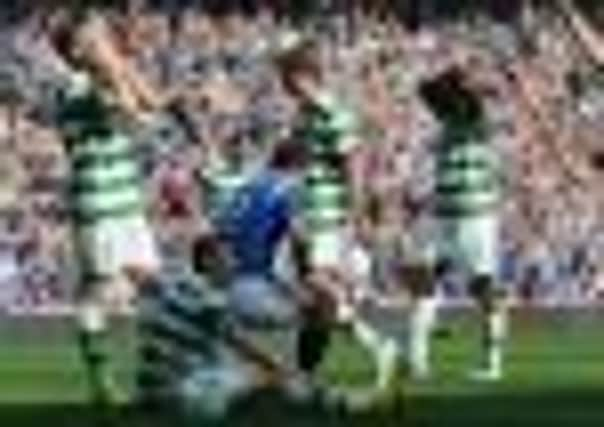Glenn Gibbons: Winning feeble league is far from ‘different class’


What is indicated in the defeats by Kilmarnock in the Scottish League Cup final at Hampden and by Rangers in the SPL collision at Ibrox is something conspicuously more banal than anything that is the subject of feverish howling by the respective supporters. This phenomenon does, however, have significant relevance to a “debate” that has provoked some desperate nonsense since the Ibrox club’s descent into administration.
Anyone with a proper sense of the general mediocrity of the Scottish game will have, some time ago, recognised the truth that, in such a climate, no result can be regarded as entirely shocking. In a league where there is little variance in the contestants’ standards of performance, there is rarely a long wait between “surprises”.
Advertisement
Hide AdAdvertisement
Hide AdIt is why, for decades, bookmakers have earned untold fortunes from punters willing to plunge on the outcome of matches in the lower divisions. In those areas, teams are almost invariably so closely matched in their poverty that people with a sound grasp of betting value could not be tempted into a wager with a gun at their head.
In relation to the talent-rich leagues of the continent, the SPL has joined the underclass of Europe, the inevitable consequence of years of the country-wide decline in standards. With his relentless insistence that the national team is presently replete with superstars, Craig Levein may have convinced himself, but most of the rest of us await persuasive visual evidence on the field of play
While Celtic’s status as Scotland’s most formidable team this season has been firmly established, the more sober of their supporters will have realised that, despite a long unbeaten run in the middle period, they cannot reasonably be described as “different class”. Indeed, it is difficult to escape the conviction that their now inevitable league championship will be devalued because of the scantiness of the opposition.
This should not be confused in any way with the claim that their title will be “tainted” on the grounds of Rangers’ ten-point penalty for fiscal mismanagement. That is patently a ludicrous argument, given the Ibrox team’s deterioration long before the revelation of the financial morass – or the departure of their leading scorer, Nikica Jelavic.
But the low value of Celtic’s championship this season will be little different from several that the Glasgow clubs have shared in the last few years, when the feebleness of the league has been horribly exposed in Europe.
While it is not difficult to detect the potential for improvement in a number of the younger players in Neil Lennon’s squad – and, by extension, progress as a team towards a higher level of performance – they seem a long way from proving themselves exceptional.
Until they do (and Europe is usually the most reliable test bed), they will remain as flawed as any other ordinary mortals.
Ignoring fans for TV was own goal for clubs
Football affords its citizens the luxury of becoming enmeshed in revolution without the slightest risk of bloodshed. In the circumstances, anyone would think the old game would be awash on virtually an annual basis by radical proposals and ideas that would effect great sea changes in a business that, like any other, cannot afford to stagnate.
Advertisement
Hide AdAdvertisement
Hide AdInstead, it has taken the dozen years since the SPL became a 12-team organisation in 2000 for the ten non-Old Firm clubs to summon the nerve to challenge Celtic and Rangers on the iniquity of a voting system that, requiring an 11-1 majority on constitutional issues, owes more to the old Politburo at the Kremlin than it does to any self-styled modern democracy.
As the commendably expansive Hibernian managing director, Fife Hyland, emphasised in The Scotsman this week, much more consideration has to be reserved for supporters, with the ratio of attention paid to TV companies and the clubs’ paying customers having become dangerously askew. Hyland’s concerns chime with a tale related by Bill Wilson, the former commercial director of the Scottish FA, at the very outset of the SPL in 1998. Wilson, a globally respected player in the corporate market, would be a natural first reference point for any fledgling group.
“They asked me about television agreements and how to go about getting the best deals,” said Wilson. “That was when it emerged that the satellite broadcasters wanted to stage matches with kick-offs at five past six on Sunday nights.
“I told them they should be very wary of that and to give proper thought to their season ticket holders. It took only a few minutes to become quite clear that they didn’t give a toss about their season ticket holders. All they saw was the TV money. It seemed obvious even then, at the very start, that consideration of the fans would not head the list of priorities.”
This was, in fact, no more than an extension of the projection revealed by Freddie Fletcher, the commercial director at Rangers after the Lawrence construction company had assumed control at Ibrox in 1986. Fletcher said that his ultimate objective was to create a climate in which attendances would amount to only 30 per cent of the club’s revenue.
As a concept, at the time, this was the equivalent of 15th-century Italians being told by Columbus that the world was round. The ambition was never likely to be achieved in a country as small (in the context of potential TV audiences) as Scotland, but it appears to have taken the visionaries of the SPL 14 years to have made the connection.